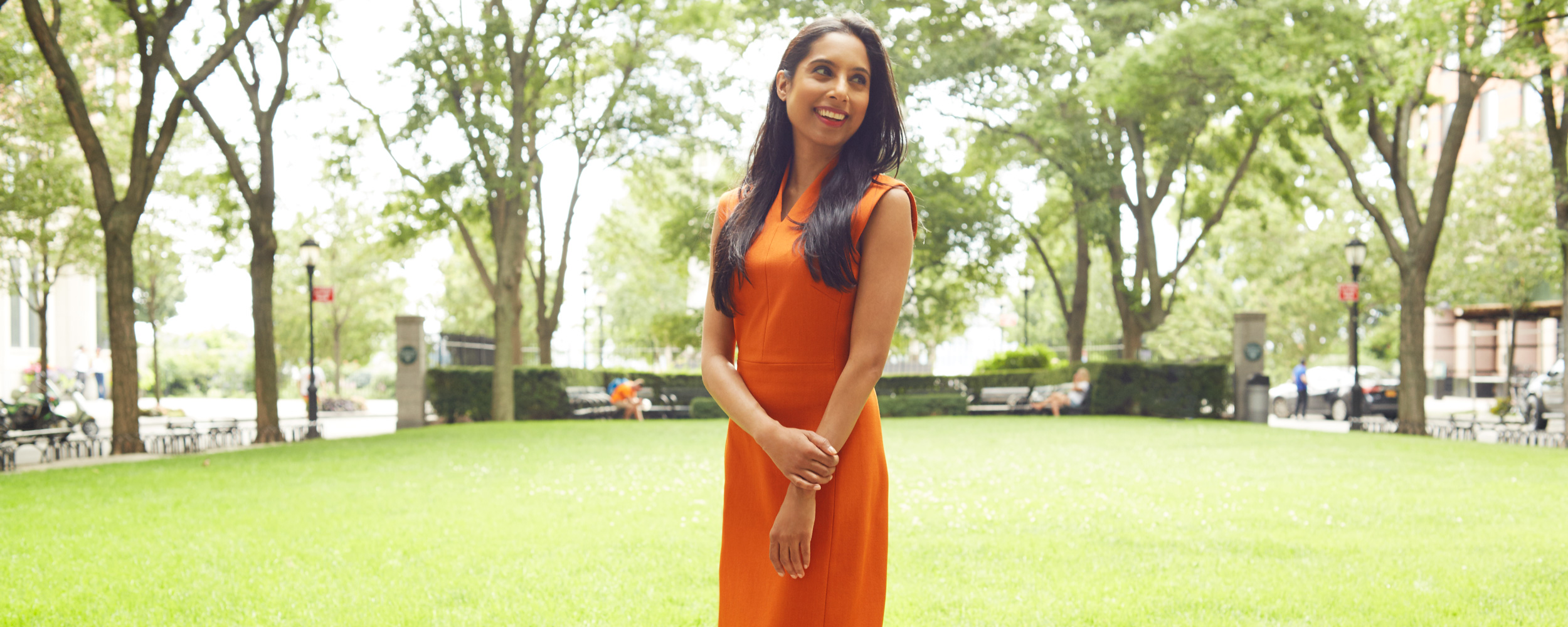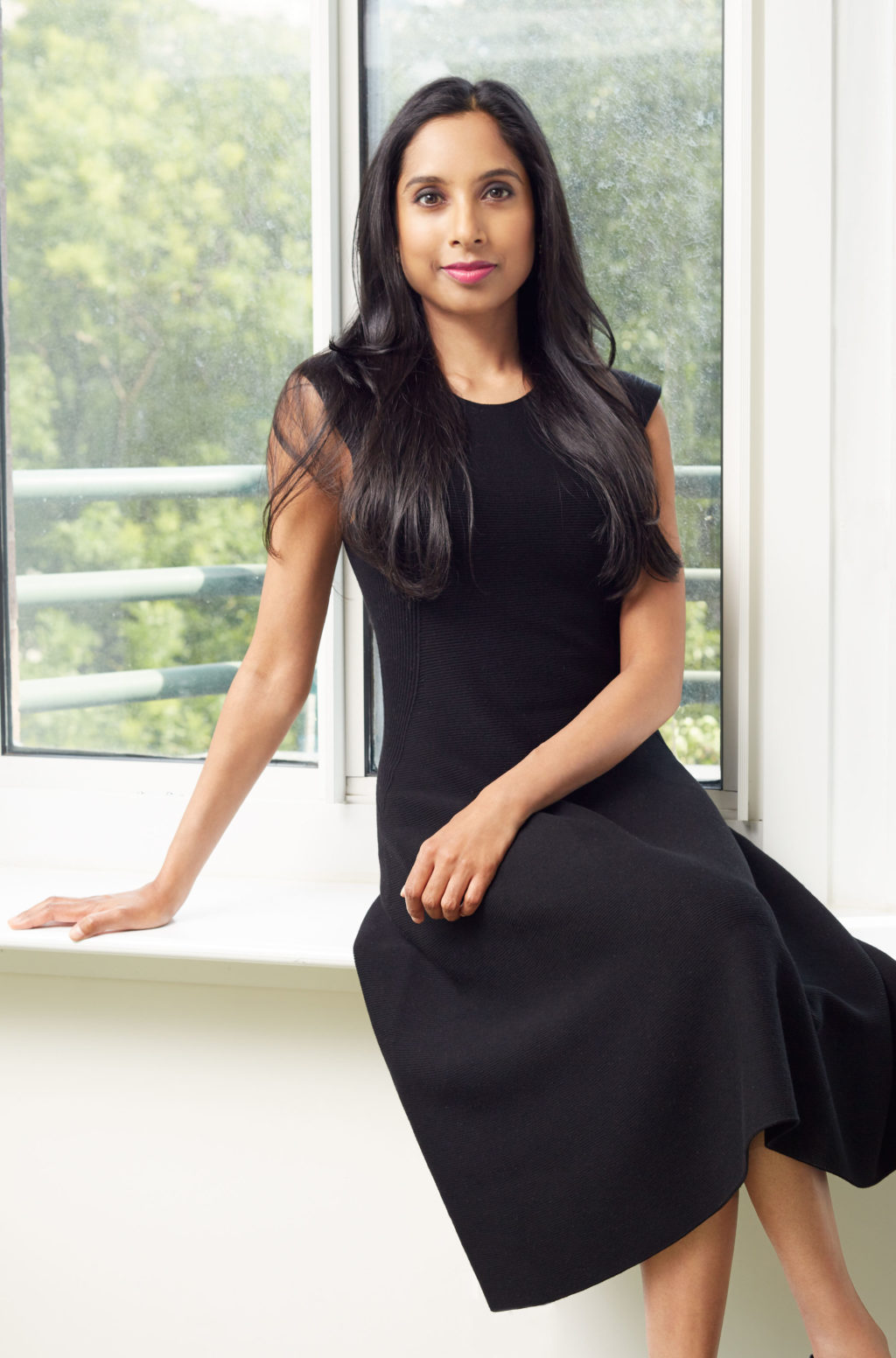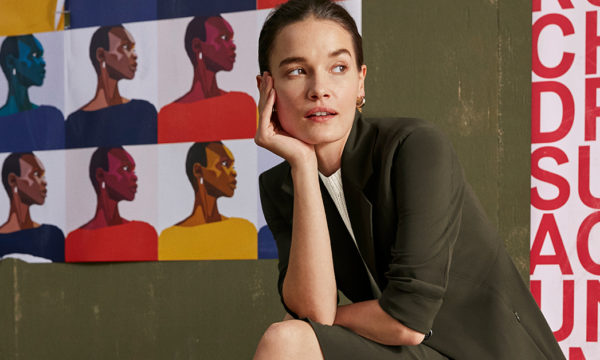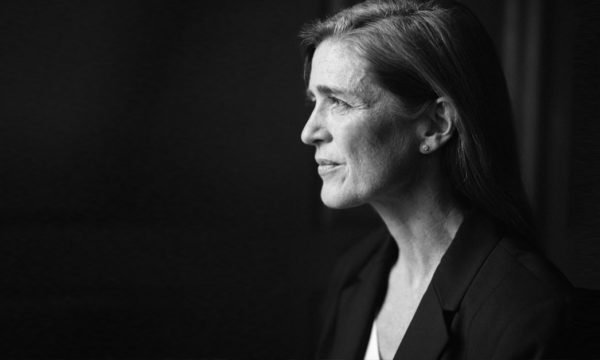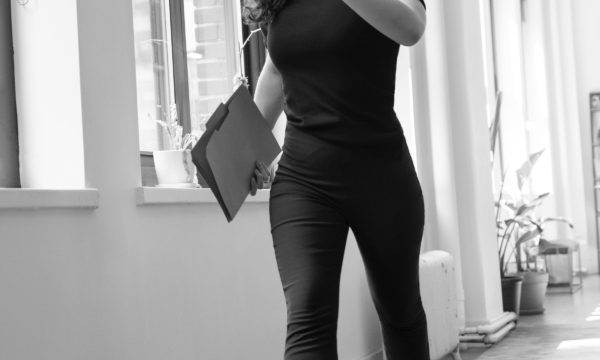Meet the Doctor With a Side Hustle—or Three
August 11, 2017 | Filed in: Woman of the Week
Dr. Roshini Rajapaksa—or “Dr. Raj,” as she’s known—has never been much of a mono-tasker. Even as a pre-med student at Harvard, she decided to major in English, too, to give herself “a break” from the hard sciences. Today, she splits her time between three careers: she’s a gastroenterologist at the NYU Langone Medical Center, a Today show contributor, and the co-founder of Tula, a probiotic skin care company that she launched in 2014. We paid a visit to her apartment in Manhattan, which she shares with her husband and two sons, to chat about packed schedules, multiple jobs, and underrated solo getaways.
MY MOM IS A GASTROENTEROLOGIST, like me, and my dad’s a lung specialist. They’re both Sri Lankan, and I grew up in Westchester, New York. I knew from a young age that I wanted to work in medicine, but they never pushed me towards it. They just said, “Whatever you do, it should be something that helps people.” I think the biggest influence was to see how much satisfaction they got from their jobs.
I WASN’T MARRIED to one type of medicine until I got into med school and tried out different things. I loved surgery—I loved the satisfaction of going in, seeing a problem, and being able to fix it. But I didn’t love the very long hours of the actual surgeries or the fact that you didn’t have a lot of long-term relationships with patients. So gastroenterology is a happy balance between doing relatively short procedures and fixing things, and more long-term relationships with chronic patients.
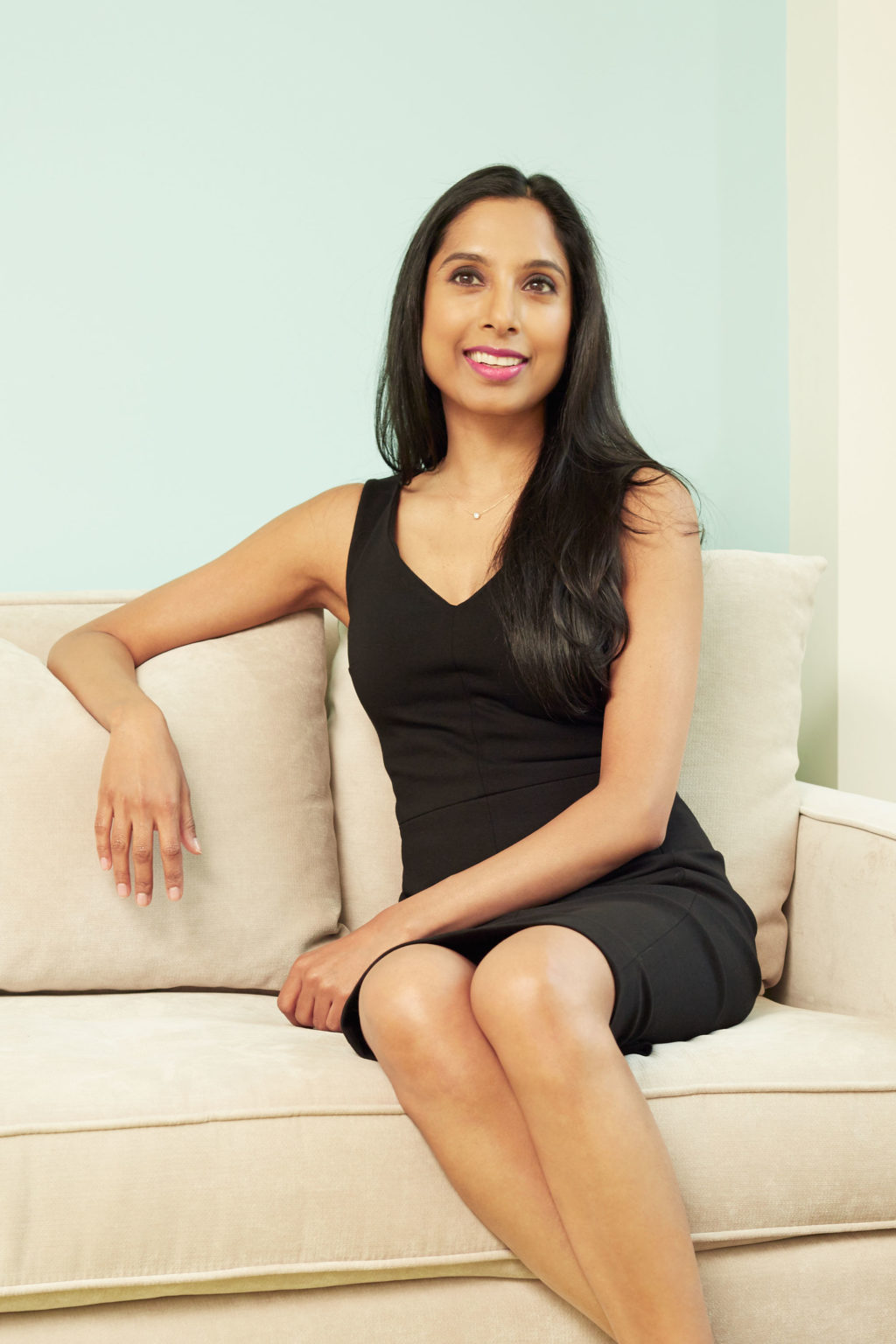
Roshini wears the Rachel dress in black.
MY PARENTS HAD A BIG INFLUENCE on my philosophy towards work-life balance because they’re both extremely hard-working, but they also know how to enjoy themselves. When I was growing up, they always made it seem like it was possible to work hard and have long hours, but also travel and socialize and throw parties and enjoy music and play instruments. I’ve tried to emulate that work-hard, play-hard mentality.
I GOT INTERESTED IN DOING MEDIA after I was in fellowship, where I did a research project with a more senior attending. When it came time to present our findings at this big gastroenterology meeting, he said, “I want you to do it.” It was a nice gesture and a great opportunity for me, to present something in front of a large audience of my peers and colleagues and people more advanced than me. I really enjoyed it, and I won an award for presenting, so it was an exciting first experience and it got me interested in pursuing more public speaking. That was the genesis of feeling comfortable talking about health topics in front of a very large audience, which ultimately led to my media career. It certainly wasn’t something I went into medicine thinking I’d be doing, but it’s become like a second career for me.
THERE’S A CERTAIN GLAMOUR of being on TV and all that, but there’s also the idea that you’re reaching so many people, with just this short three-minute segment. The first time I did it, I was talking about colon cancer screening, and demystifying it so people aren’t so scared to go get their tests, which is something I’m passionate about. I was really hooked from that moment on, and because I had a good experience and they liked me, one thing led to another. Now it’s 13 years later and I’m still doing it.
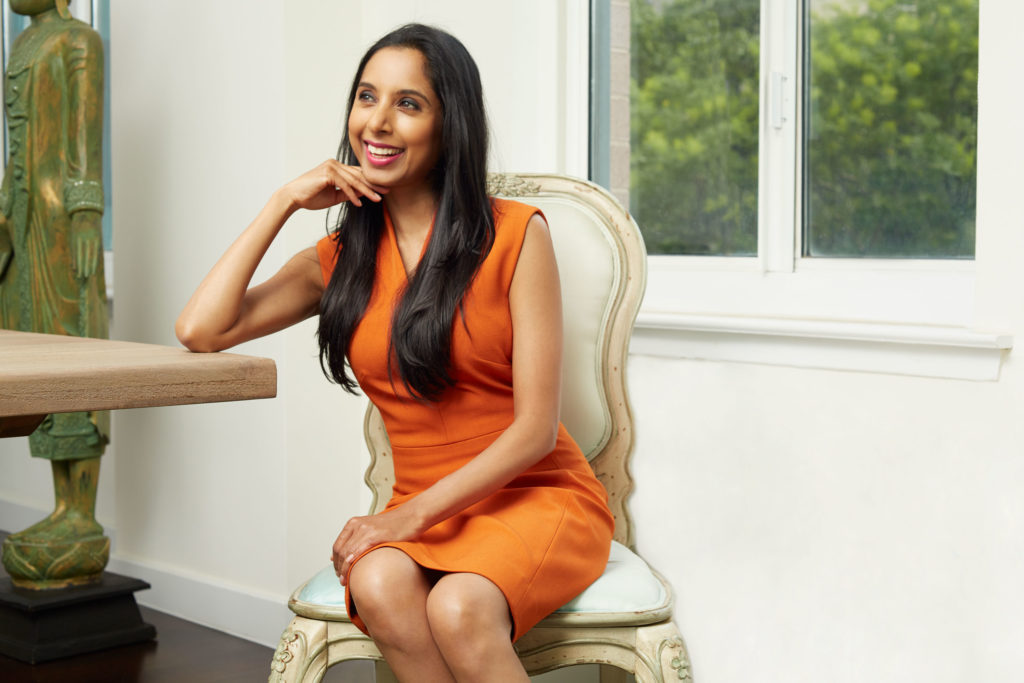
Roshini wears the Aditi 2.0 dress in persimmon.
I STARTED TULA IN 2014 because I was eager for a new project. I’d been doing media for a while, and then I wrote a book, and the next logical step was to actually create a product that helped people be healthier in some way. I wasn’t quite sure what that was going to be, and I was thinking about a few different options, and maybe something in the beverage space. I wanted it to be something that I was personally involved in, so probably something gut-health related. But then, randomly, I met one of my co-founders, who’s the co-founder of Bobbi Brown and has a huge amount of beauty experience. We started chatting, and decided that we would work together, but he wanted me to be the DNA of the brand. I’ve always been interested in probiotics, but I didn’t really think about the skin connection until I met him. I was about 40 at that time, and starting to think about my own skin aging, and when I looked into the connection between probiotics and the skin, I found that there was some fascinating new research coming out about it. I thought, “Wow, this could be a game-changer in the skincare industry.” And it’s really taken off.
I THINK I WOULD GET BORED doing the same thing day in and day out. The fact that I’m doing three different things that I really enjoy right now—the TV work, Tula, and working at the hospital—is something I really love. I’m busy, but I am the one choosing to do it. I could always pare down on one or the other. But for now, they energize me in different ways. The doctor part is probably the most stressful, because when you think about what’s at stake… but I definitely will never give that up because it’s so satisfying on a core level. The other things don’t give me that same direct personal connection, but I would miss one of them if I gave it up, too.
STARTING A COMPANY involves a lot of ups and downs, emotionally. Nothing is guaranteed, and there’s no set path. Even when something great happens, the next day something terrible can happen. There are major highs and lows, and those swings are hard. That’s a big contrast from the traditional path of medicine, where if you do the work and are conscientious with patients, you proceed to the next level and things work out. So the uncertainty is new. But at the same time, I have another career, so it wasn’t like everything was riding on this, financially and professionally. Also, working with other people was a new challenge. You’re pretty independent as a doctor, and in almost every setting, you are fairly in control of a lot of things. Whereas when you’re running a company, you have to listen to your customers, your employees, and your coworkers—everybody has different opinions, and sometimes complaints. Having to deal with the human side of it has been more challenging for me because I’m just not used to it. You have to negotiate, and there’s a lot of give and take.
IT CAN BE HARD TO CARVE OUT SPACE to sit and think about a long-term vision when you’re so caught in the weeds of day-to-day stuff, but I try to be very efficient and conscious of time, sometimes to a fault. I’ve figured out a way to do my TV segments right before I go to the office, and I’m at the hospital three days a week. I keep a very tight schedule, and it’s just about being mindful of all these moving parts. That doesn’t bog me down; in fact, if I have a lot to do in a day, it gives me energy. Sitting around waiting for something is my worst fear. But there are definitely times when something runs late, and I’m rushing to get to the next thing, and I’m like, “Why did I do this to myself? I could have given myself a cushion.”
TO DECOMPRESS, I read every night before I go to sleep, even if it’s for 10 minutes. I love mystery novels—British mysteries, particularly. We don’t have a lot of time to do long trips, but I love to do weekend trips here or there, either with the family or sometimes even by myself. I’ll just go for like, 24 hours to the Hamptons, and decompress a little bit. Traveling solo is great, especially when you have kids.
WHEN I’M ON TV, which I am at least a couple of times a week, I like to wear bright, jewel-toned dresses that are fitted. I think that’s what looks best on screen, and it gives me the energy and confidence I need. But in contrast to that, when I’m doing pretty much anything else, I’m super casual. At work, I wear scrubs all the time. And then for Tula, it’s casual—we’re a startup, so I tend to wear easy, comfortable things.
Photographs by Maria Karas.





